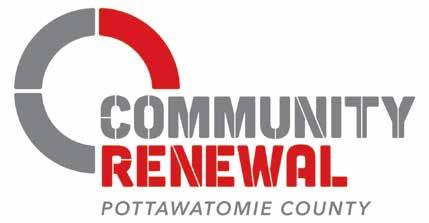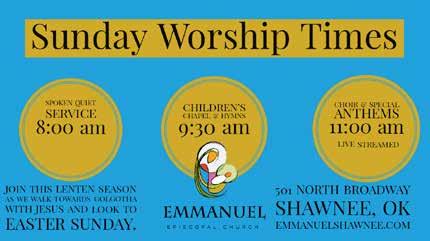
4 minute read
Over the Fence: Place At The Table
from Shawnee Outlook
By Brandon Dyer, Executive Director of Community Renewal of Pottawatomie County
Not long ago, my wife and I stayed the night in Oklahoma City in an area of town we like. It’s an area that’s not terribly busy but still has great restaurants and stores and places to walk around. It’s a nice little getaway spot for us.
Advertisement
We happen to enjoy finding new places to eat brunch. Waking up that morning, we decided to try a new place we had heard of just a short walk away. It was quite cold outside, so no outdoor seating was available. Inside, the place was packed. There were several people in line in front of us and exactly zero tables available.
Have you ever been there? You’re hungry, the line is long, and you can already tell that it’s going to be a battle to find a seat. If you’re like me that’s when you begin to get a little cranky. Fortunately, the line moved reasonably quickly, and we placed our order and held our pager to let us know when our food was ready to be picked up at the window. That’s when I started to get a little anxious. It’s silly, I know. But I started to wonder which one of these couples standing around waiting for a table to open up were going to try to outrun me when someone got up to leave? I was fully aware of the order of who “should” be next in line for a table, but would everyone else follow the same unwritten rules of courtesy?
This is one of those little moments in life when the goodness of humanity is tested. Are people basically good? When we are tempted to think of ourselves first, what do we do?
By my count, there was one couple in front of us for the next table. After what felt like an excruciatingly long time, a table opened up. To be friendly, I leaned forward to them and said, “you’re up.” They appreciated the gesture and probably appreciated not having to arm wrestle me over it as well. Our pager went off, and I went to get our food. As I picked it up, another table became free. I looked over at my wife, she was thinking what I was thinking. To my relief, no one even appeared to be tempted to challenge her. We sat and enjoyed our brunch.
We watched as the line grew longer, and the wait for tables increased as uneasy customers scanned the dining room to determine who might leave next. Guess what? Everyone seemed to have the same understanding of this invisible social order, and it played out to perfection. The goodness of humanity won the day. Why did I have such little faith in my fellow sisters and brothers?
It seems to me that we all carry a basic sense of justice within us. In most cases, we can adjudicate right from wrong in a largely agreeable way. But what happens when someone doesn’t follow this unspoken scale of equity? What are we to do when someone cuts in line? For many of us, it triggers a burning sense of violation, even if in this case it might be somewhat minor. Some of us would speak out. Others would let it go to avoid conflict. I suppose neither response is right or wrong.
But suppose we apply this shared sense of justice to more complicated matters. Matters that don’t respond easily to a cooperative social litmus test of right and wrong. It breaks down at some point because we don’t all agree on every single matter. We have opinions based on myriad factors that shape our decisions and points of view. To make collective justice even more evasive, sometimes our opinions change over time, and we’re just not always consistent if we are being honest. So whose opinion governs? For how long? Is justice sometimes murky? You bet it is.
This is why it is imperative that we not avoid the work of building community. Being in community with each other first requires a relationship built on basic trust. Recognizing the inherent capacity for good that we each possess. It also requires us to be trustworthy. When friendships are formed around this basic sense of trust, even with acquaintances, it becomes much easier to hear someone’s point of view without vilifying them for simply being on the other side of an issue. When we’ve taken the time to see the good in each other, we are more likely to work together to find solutions that work for us all. It’s that sort of cooperation that restores our faith in humanity and helps us find our place at the table.
Brandon Dyer







